Doctor Referral Letter
[Your Name]
[Your Address]
[City, State, ZIP Code]
[Email Address]
[Phone Number]
[Date]
[Recipient's Name]
[Recipient's Title]
[Medical Facility/Hospital Name]
[Medical Facility Address]
[City, State, ZIP Code]
Dear [Recipient's Name],
I am writing to refer my patient, [Patient's Full Name], for specialized medical care and evaluation under your expertise. I believe that [Patient's First Name] would greatly benefit from your knowledge and skills in [Specialty/Department].
Patient Information:
- Patient's Full Name: [Patient's Full Name]
- Date of Birth: [Patient's Date of Birth]
- Gender: [Patient's Gender]
- Medical Record Number (if applicable): [Patient's MRN]
- Brief Medical History/Diagnosis: [Briefly describe the patient's medical condition or reason for referral]
I have been providing medical care for [Patient's First Name] and have conducted initial assessments, diagnostic tests, and initiated treatment as necessary. However, I believe that the complexity and specialized nature of [his/her] condition warrant consultation and care from a specialist in [Specialty/Department].
I kindly request your expertise in evaluating [Patient's First Name]'s medical condition and developing a comprehensive treatment plan. I am confident that your specialized knowledge and experience will provide valuable insights and contribute significantly to [his/her] overall well-being.
Enclosed with this letter, please find relevant medical records, test results, and any relevant imaging reports to assist you in your assessment. Please feel free to contact me at [Your Phone Number] or [Your Email Address] if you require any further information or have questions regarding the patient's medical history.
I greatly appreciate your attention to this matter and your dedication to providing the best possible care to [Patient's First Name]. I trust that your collaboration will lead to improved outcomes and enhanced patient care.
Thank you for your prompt attention to this referral. I look forward to receiving your assessment and recommendations for [Patient's First Name]'s care.
Sincerely,
[Your Signature]
[Your Printed Name]
[Your Medical License Number (if applicable)]
[Your Title/Position]
[Medical Facility/Hospital Name]
[Medical Facility Address]
[City, State, ZIP Code]
[Email Address]
[Phone Number]
Enclosures: [List of enclosed documents, if applicable]
General Doctor Referral Letter
Subject: Referral for Specialist Consultation
Dear Dr. [Specialist’s Name],
I am referring my patient, [Patient Name], age [Age], for further evaluation and treatment. The patient has been under my care for [Condition/Issue] and requires specialized attention for [specific reason].
Relevant medical history and test results are attached for your review. Please advise on further management and necessary treatment steps.
Thank you for your assistance.
Sincerely,
Dr. [Referring Doctor’s Name]
Urgent Referral Letter
Subject: Urgent Referral for Immediate Consultation
Dear Dr. [Specialist’s Name],
I am urgently referring my patient, [Patient Name], age [Age], who is presenting with acute [Condition/Symptoms]. Immediate specialist evaluation is required to prevent complications.
Attached are recent test results and medical notes. I appreciate your prompt attention to this matter.
Regards,
Dr. [Referring Doctor’s Name]
Formal Referral Letter with Detailed Medical History
Subject: Referral for Specialist Assessment
Dear Dr. [Specialist’s Name],
I am referring [Patient Name], age [Age], for evaluation regarding [Medical Condition]. The patient has been managed for [Previous Treatments/Medications], but symptoms persist. Please find attached comprehensive medical records, lab results, and imaging studies for your assessment.
Your expert evaluation and recommendations for further management will be greatly appreciated.
Sincerely,
Dr. [Referring Doctor’s Name]
Provisional Referral Letter
Subject: Provisional Referral for Specialist Opinion
Dear Dr. [Specialist’s Name],
I am referring my patient, [Patient Name], age [Age], for your expert opinion regarding suspected [Condition]. Initial assessments suggest [Brief Findings], but further evaluation is required to confirm diagnosis and plan treatment.
I would appreciate your assessment and advice on appropriate next steps.
Thank you,
Dr. [Referring Doctor’s Name]
Referral Letter for Pediatric Patient
Subject: Referral of Pediatric Patient for Specialist Consultation
Dear Dr. [Specialist’s Name],
I am referring [Child Name], age [Age], for evaluation of [Pediatric Condition]. The patient has been monitored for [Symptoms or Conditions], and parental concern necessitates specialist input. Relevant growth charts, immunization records, and test results are attached.
Your assessment and recommendations will help in ensuring optimal management.
Best regards,
Dr. [Referring Doctor’s Name]
Referral Letter for Follow-up or Second Opinion
Subject: Referral for Second Opinion / Follow-up
Dear Dr. [Specialist’s Name],
I am referring my patient, [Patient Name], age [Age], for a second opinion regarding [Medical Condition]. Previous treatments have included [List Treatments], but further guidance on management is requested. Attached are medical history, test results, and imaging studies for review.
Thank you for providing your expert evaluation.
Sincerely,
Dr. [Referring Doctor’s Name]
Quick Email Referral
Subject: Patient Referral – [Patient Name]
Dear Dr. [Specialist’s Name],
I am referring [Patient Name], age [Age], for consultation regarding [Condition]. Brief history and recent lab results are attached. Kindly advise on next steps.
Regards,
Dr. [Referring Doctor’s Name]
What is a doctor referral letter and why is it needed?
A doctor referral letter is a formal communication from one medical professional to another, requesting specialized evaluation or treatment for a patient.
Purpose:
- Ensure continuity of care.
- Provide necessary medical history and context.
- Facilitate timely and appropriate specialist intervention.
- Document communication for legal and administrative purposes.
Who should write a doctor referral letter?
- The referring physician or primary care doctor is responsible for writing the referral.
- In some cases, nurse practitioners or physician assistants may draft the letter under a physician's supervision.
- It should appear as professional and authoritative, reflecting medical responsibility.
To whom should a doctor referral letter be addressed?
- Specialist doctors (cardiologist, neurologist, dermatologist, etc.) based on the patient’s condition.
- Consulting hospitals or clinics if specialist is affiliated.
- Administrative or insurance departments if the referral is required for approval.
When is a doctor referral letter required?
- For specialized evaluation beyond the referring doctor’s scope.
- When a second opinion is necessary.
- For pediatric, geriatric, or complex cases requiring expert input.
- Before certain medical procedures or treatments that need specialist approval.
How to write and send an effective doctor referral letter
- Begin with patient’s name, age, and primary concern.
- State the reason for referral clearly.
- Include relevant medical history, test results, and attachments.
- Provide a summary of previous treatment or interventions.
- Maintain a professional and courteous tone.
- Send via secure email, fax, or printed letter according to hospital policy.
Key elements and structure of a doctor referral letter
- Subject line: Patient referral with condition.
- Greeting: Address the specialist formally.
- Patient details: Name, age, relevant history.
- Reason for referral: Include symptoms or concerns.
- Medical background: Treatments, test results, previous interventions.
- Attachments: Lab reports, imaging, notes.
- Closing: Thank the specialist, include contact info, and signature.
Common mistakes to avoid in doctor referral letters
- Omitting patient age or identifying information.
- Failing to specify reason for referral.
- Not attaching necessary reports or test results.
- Using informal or unclear language.
- Sending letter to incorrect specialist or department.
Tips for effective doctor referral letters
- Keep it concise and clear.
- Attach all relevant medical documentation.
- Highlight urgency if required.
- Verify recipient details to avoid delays.
- Use professional tone even in email formats.
After sending a doctor referral letter
- Confirm receipt with the specialist’s office.
- Provide additional information if requested.
- Follow up on specialist recommendations.
- Update patient records with referral details.
Compare and contrast doctor referral letters with other medical communications
- Referral letters vs. Patient discharge summaries: Referral is for specialist input; discharge summaries summarize hospital stay and care.
- Referral letters vs. Consultation emails: Emails may be quicker but formal letters provide detailed documentation and attach reports.
- Similarity: Both maintain patient care continuity and record important medical interactions.









 Download Word Doc
Download Word Doc
 Download PDF
Download PDF